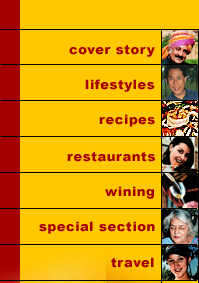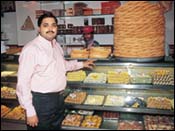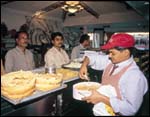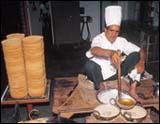


 If It�s LMB, You Must Be Eating Ghevar!
If It�s LMB, You Must Be Eating Ghevar!
The ghevar in Jaipur�s Laxmi Misthan Bhandar is world famous, writes YASMIN S. KHAN. When Bill Clinton was in the Pink City last year, even he insisted on tasting it and taking a packet home. |
|
Coming down from his pedhi over the sweet counter, he led me into LMB�s kitchen. There, in an open space beneath a skylight, a halwai sat over a bhatti making the ghevar. Bhattis are fuelled by charcoal and wood, but at LMB they were using gas. And they had covered the bhatti on all sides with mud and bricks, leaving the top open for direct temperature-controlled heat. The halwai was frying the ghevars in an oval-bottomed kadai in desi ghee, pouring the ghevar mix in layers, five grams at a time, from a small ladle.
To make one ghevar, he had to dip the ladle into the mix and pour it into the bubbling ghee 80 times in a smooth, unbroken flow. This gives the ghevar an unique honeycomb appearance, like Mysore pak. He took about 15 minutes to make one ghevar. I marvelled at his patience and thought the procedure was tedious and back-breaking. Especially since ghevar was LMB�s best-selling item and waiters were constantly coming in and picking up whatever he had made. But the halwai went about his job impassively, his hand moving in a blur, quite aware that his fame as the ghevar-maker of Jaipur had spread far and wide.
The ghevar also undergoes a sweetening process. It is dunked in a sugar syrup made of saffron, kewda, elaichi and kastoori. The sweetened ghevar is left to drain for 25 minutes. And it comes out crisp and delicate from the top, but soft and spongy from within. Ajay Agrawal told me the ghevar is a sweet for all seasons. It is delicious, nutritious and wholesome. �In the dry and scorching Rajasthan summer, it reduces the heat of the stomach and keeps you cool, gay and elated,� he explained mysteriously.
There is lot more to LMB than its ghevar, of course. The sweet-shop was started 60 years ago, but the family has been in the sweetmeats business for over 250 years. Their earliest records date back to 1750 and an ancestor by the name of Ghodamalji Kayal. The business was named Laxmi Misthan Bhandar only after Independence.
There were no names before that, no branding, and all establishments were known by the names of their proprietors,� Ajay Agrawal said. The restaurant was started in 1952, and the hotel, a three-star property with 33 centrally air-conditioned rooms (tariff: Rs. 1,375 for a double room), in 1962. They all go by the name LMB. The place is a landmark in Johari Bazar, an unostentatious glass, marble and granite structure in the heart of the Pink City.
The restaurant is where most of the business is done. You may sit inside and order any of the sweatmeats, the lassi, ice-creams, malai kulfis, the many chaats, a tangy kachodi, from the sweet counter outside. Or you may have lunch and dinner. There is a Rajasthani menu, pure vegetarian and authentic, with Panchmela Saag, Kair Sangri Kumita and Dum Aloo Jaipuri.
And a shahi thal that LMB�s master chef recommends. It is very Rajasthani, more than the a la carte menu. Papad Mangodi soup, Kadi Chokan-wali, Bela Rajasthani (�A treat for vegetarians,� Ajay Agrawal said), the Saag and Sangri again, Dal, Pulao, salad, choice of rotis and Rasmalai, Mishri Mava, Barfi or Gulab Jamun for dessert. Cost: Rs. 215.
I asked him what kind of clientele he got for lunch and dinner, and Ajay Agrawal replied, �About 40 per cent foreigners, the rest Indian. Of the Indian customers, 50 per cent are tourists, 50 per cent locals.� The LMB family is one of Marwari Agrawals, they are not Jains, but still the food is without onion and garlic. �It is satvic food prepared in vishudh ghee,� he said. �
Food which promotes longevity, intelligence, vigour, health and cheerfulness, and which is sweet, bland, substantial and naturally agreeable. That�s how Lord Krishna describes satvic khana in the Bhagwad Gita. Purity of mind follows purity of diet. LMB�s commitment to this ideal is a manual of faith.� It was his boast, the food their chef prepared was good enough to be offered to God. In fact, it was first offered to God as prasad, then only did the chef taste it. How did the chef know whether it would be good or not, I asked. And Ajay Agrwal replied, �He makes it.� I suspect, he was not talking about the chef in this context.
They have lot more to offer at LMB than the ghevar and Rajasthani meals. It�s chaat counter is busy round the clock selling Potato Chops, Dahi Bada (yes, they spell it that way), Samosa, Kachori, Aloo Papri Chaat, Fruit Chaat, Dall Moth, Mixed Namkeen, Vegetable Cutlet, French Fries, Khaman Dhokla, Kulfis, Badam Milk and a lassi that has people standing in queue for. Most of the things on sale there, young Ajay Agrawal said he could personally get behind the cooking range and make. He has a catering college background, but no catering college can teach you to run this kind of eatery, he said. His is all hands-on experience.
What did he think LMB was most famous for, I asked. And he promptly replies, �The ghevar, naturally.� Why naturally? �Because people buy it to take round the world. Bill Clinton, when he came to Jaipur, sent his delegation to LMB to have dinner. No, he didn�t come. Security ka jhan-jhat hai. But they packed ghevar and took back for him. I said, �Tell Clinton it will last for 10 days�.�
|

Home Page
About the mag
Subscribe
Advertise
Contact Us

